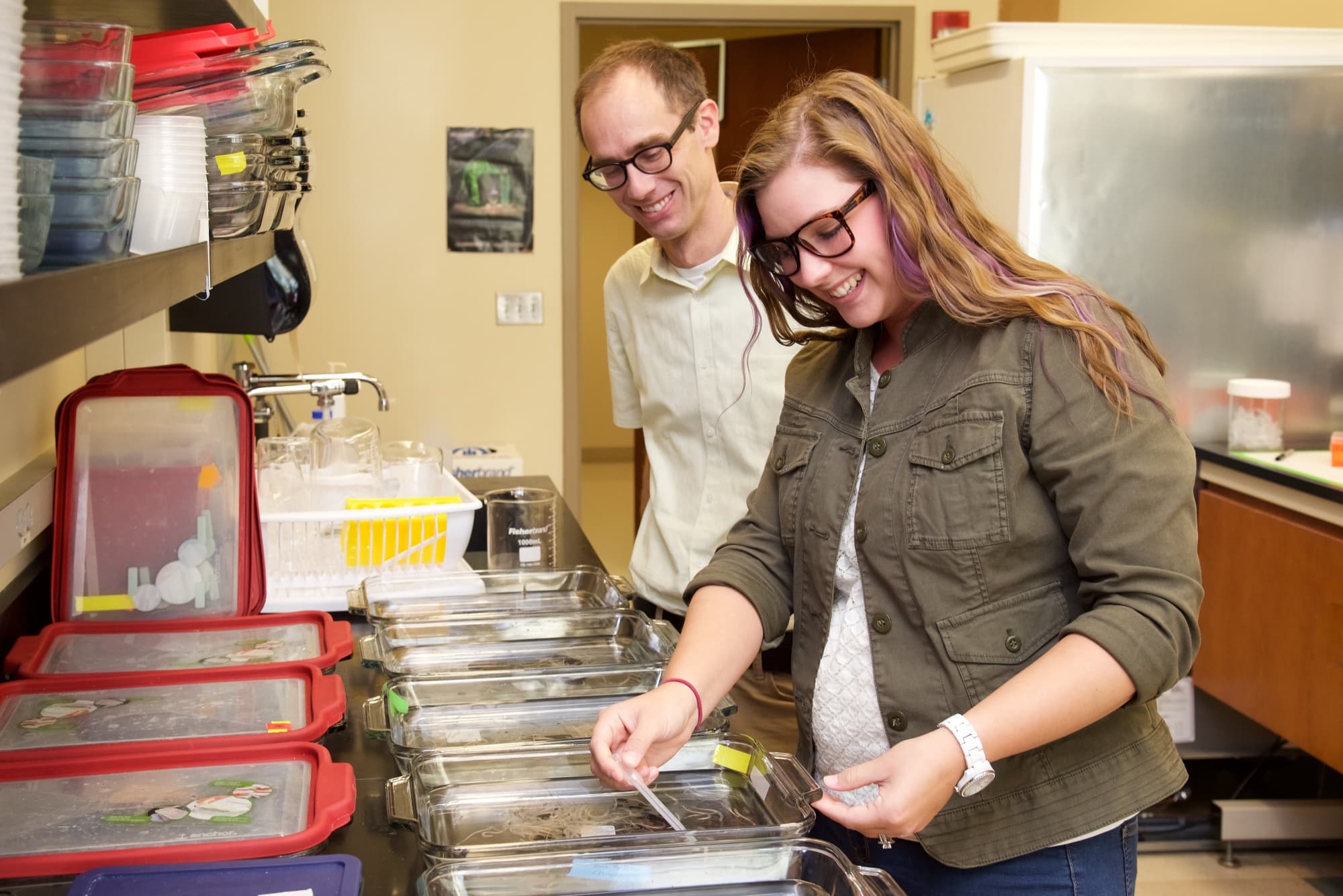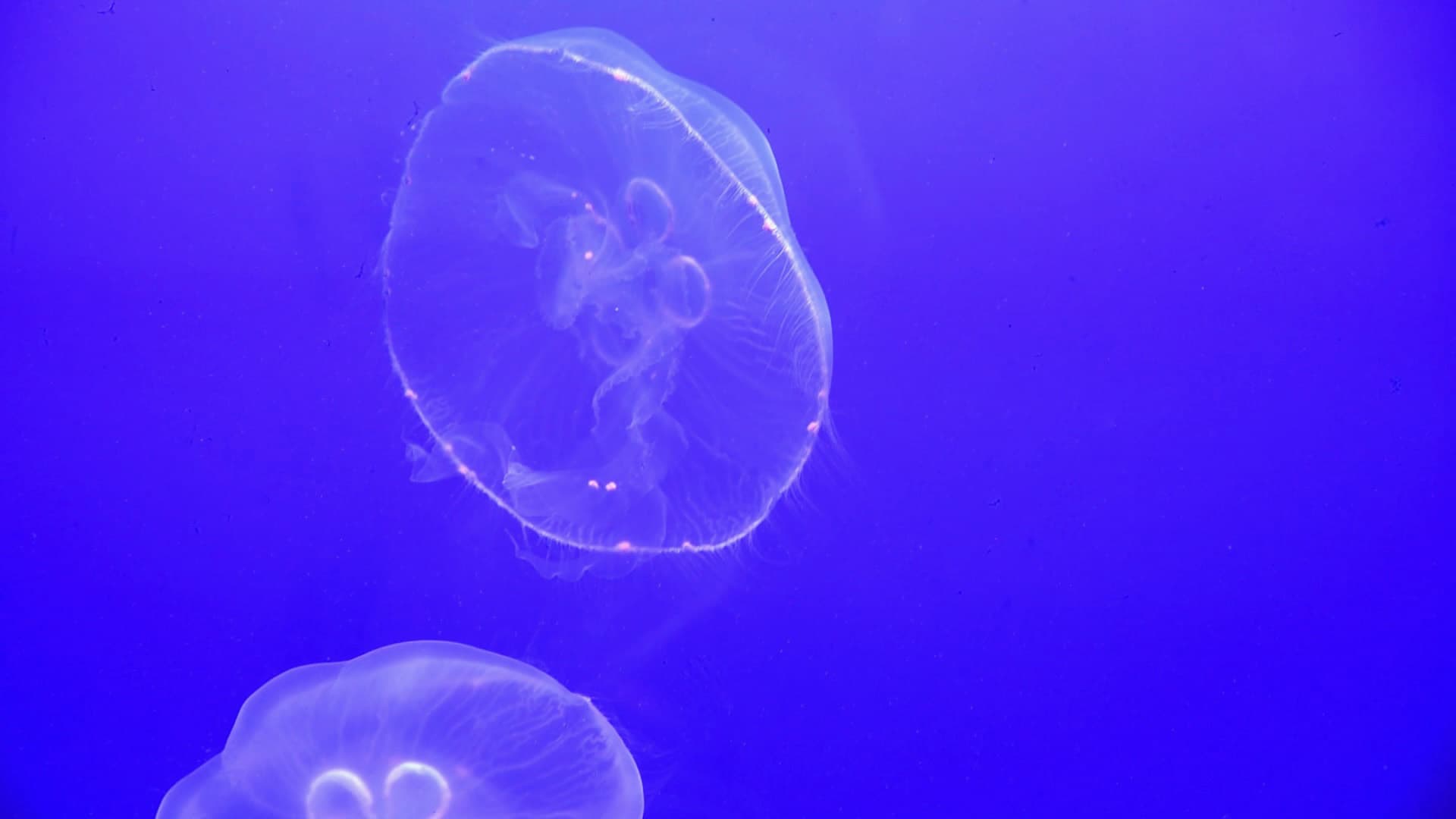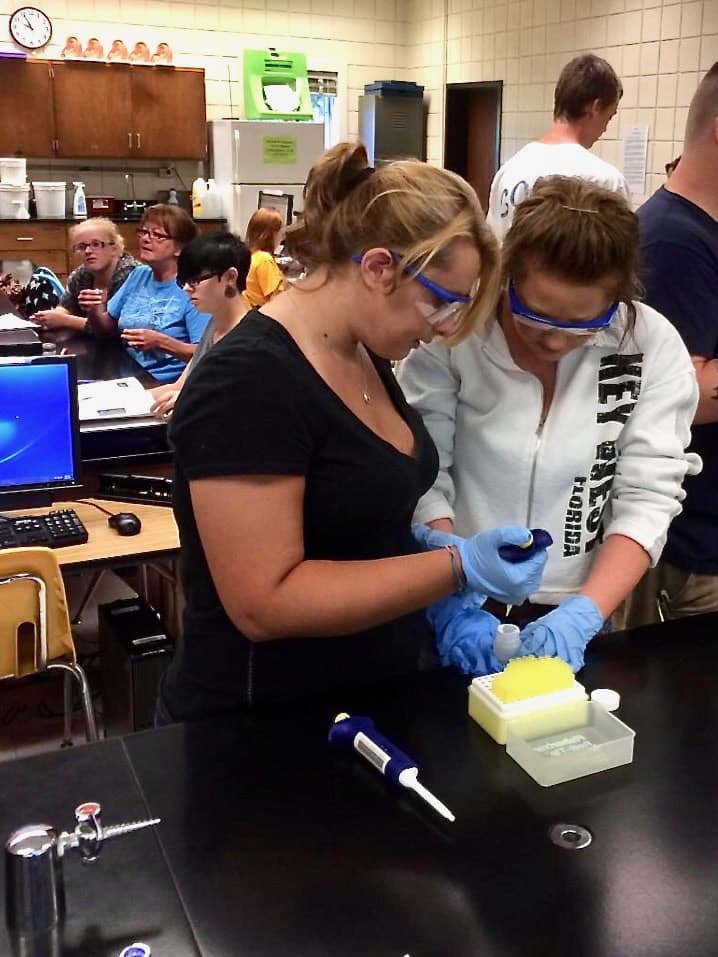Collaborative Power: How researcher Adam Reitzel and his lab are impacting science education
By Lynn Roberson

Adam Reitzel and his students, including Whitney Leach, engage with the community through research.
When the weather turns warm, and ants come out of dormancy, students in Parks Collins’ biology class at Mitchell Community College in Statesville head outside to collect specimens.
“We trap ants in locations across campus, and — working as research groups — the students bring those ants into the lab, and they try to identify those ants as best as they can and as specifically as they can with field guides,” Collins said. “They record how many different species they have, the types of species they have, and then we take the ants through a process where we are extracting their DNA and then sending the DNA off to be sequenced.”
To guide their research, Collins is using a lab module he created with UNC Charlotte researcher Adam Reitzel and the professor’s lab team members. Their collaboration started when Collins, a community college instructor, searched for a university researcher with a sharing mindset and an active learning approach.
Collins found that — and more — with the Reitzel Lab in the Department of Biological Sciences in the College of Liberal Arts & Sciences.
A prolific researcher, Reitzel joined the faculty at UNC Charlotte in 2012. He has authored more than 60 peer-reviewed journal publications and has received National Science Foundation (NSF) grants and a National Institutes of Health AREA grant. He also received the prestigious Young Investigators’ Grant from the Human Frontier Science Program, one of only seven awarded worldwide in 2016.
Seeing how Reitzel approached his research, Collins decided to reach out.
“I had gone to some conferences and had done some reading on how we could infuse some meaningful research projects or modules into our labs, so that our students are posed with a problem, and they work their way through that problem, and nobody knows what the answer will be,” Collins said. “It’s really about ownership. The students take ownership, and they’re in control.”
This method differs from more traditional lab exercises, with their pre-determined answers and rote work.
Supporting Biological Literacy
The new approach responds to findings of the comprehensive national study “Vision and Change in Undergraduate Biology Education.” The study found that rapid advances in life sciences demand a transformation of undergraduate biology education, so that students can obtain “the level of biological literacy needed to understand, help solve and make informed decisions about the complex problems facing the world today and tomorrow.” The American Association for the Advancement of Science issued the report, with support from the NSF.
 Reitzel, a marine biologist, invited Collins to his lab to learn about its research and approach. The lab primarily studies species in the phylum Cnidaria — sea anemones, corals and jellyfish — because of their ecological importance and phylogenetic position. Lab members conduct their work through a combination of comparative genomics, molecular biology, population genetics, evolutionary ecology and field studies.
Reitzel, a marine biologist, invited Collins to his lab to learn about its research and approach. The lab primarily studies species in the phylum Cnidaria — sea anemones, corals and jellyfish — because of their ecological importance and phylogenetic position. Lab members conduct their work through a combination of comparative genomics, molecular biology, population genetics, evolutionary ecology and field studies.
“Adam was so gracious with his time and was so willing to think outside the box to help us create classroom modules that kind of had to do with the sea anemone and the genetic aspect, but they really were modules outside the exact realm of his research,” Collins said, referring to his students’ work with ants and DNA.
New questions that arose intrigued Reitzel and have contributed to an evolving, growing partnership from which both teachers benefit. In one development, Reitzel and Collins received funding support from the NSF to explore the link between toxin evolution of a venomous animal and its prey.
In another project, evolutionary biologist Jason Macrander, a postdoctoral fellow in Reitzel’s lab, worked with Collins to develop a lab case study that considers the death of herpetologist Karl P. Schmidt, who died nearly 60 years ago of internal bleeding from the bite of a boomslang snake. Schmidt, believing the bite would not kill him, kept detailed records of his symptoms.
“Bioinformatics and venom and all these things are really complex, but if you can intertwine it with a good story, then students will pay attention and understand why you do certain things, or why you’re interested in this protein, or why you want to know where this protein came from,” Macrander said.
Influencing How Labs Are Taught
The impact of the partnership with Mitchell Community College has extended beyond the lab and classroom. Collins has presented at meetings of the NC Community College Association of Biology Instructors, and he and Reitzel have provided information to other instructors at Mitchell Community College.
The partners foresee long-range potential for their work to influence the way science labs are taught.
“We see that by bringing together our different expertise,” Reitzel said, “we’re actually able to make some really novel contributions to science, and offer really unique opportunities for students in the classroom through these more learning-based labs as opposed to more cookbook-type labs.”
In addition to benefits Mitchell Community College students have experienced, UNC Charlotte undergraduate and graduate students in Reitzel’s lab have learned from the interactions with Collins and from a collaboration with Discovery Place Science. Reitzel infuses information about such projects into his classroom to show science in action.
“Not everyone wants to be in academia,” Reitzel said. “People want to go into community outreach. They want to work in government. So they have different career goals. Part of my job is to provide an environment and a platform to make that possible. Part of that is me learning how to make those opportunities available to my students, for both my students in the lab and also my students in the classroom.”
At Discovery Place, the lab’s research team is studying sea anemones, corals and jellyfish. Macrander and undergraduate lab team member Amy Klock are looking at nematocyst-ejected proteins of moon jellies at different life stages. A second project is studying venom in anemones that host clownfish, to see how gene expression changes in these cnidarians that live in an intricate symbiosis with clownfish. As part of an NSF grant, doctoral student Whitney Leach this spring will gain insights into elementary education and outreach techniques at Discovery Place.
The research at Discovery Place awill have a community educational impact, through a display showcasing the research collaboration and implications of the work.
Professional Development for Teachers
In yet another collaboration, Lenora Crabtree is teaming with Reitzel to present an intensive, seven-month professional development seminar for Charlotte-Mecklenburg Schools (CMS) teachers, beginning in April 2018 through the Charlotte Teachers Institute (CTI).
Crabtree — who is pursuing a doctorate in curriculum and instruction through the Cato College of Education — met Reitzel while working on a master’s degree in biology after being a science educator for 18 years.
“What I saw was that he had a deep commitment to producing and encouraging and mentoring scientists who are well-rounded, who understand all the aspects of the work, who are not only grounded in the science but are grounded in the importance of sharing that science with the broader public,” Crabtree said.
In the CTI seminar, Reitzel and Crabtree are drawing from their strengths to create a rich learning environment for the CMS teachers. CTI is a partnership among CMS, UNC Charlotte and Johnson C. Smith University that offers professional development for CMS teachers.
We see that by bringing together our different expertise, we’re actually able to make some really novel contributions to science, and offer really unique opportunities for students in the classroom through these more learning-based labs as opposed to more cookbook-type labs. – Dr. Adam Reitzel
The seminar Reitzel and Crabtree are leading will consider environmentally driven modifications of DNA through the lens of social justice, specifically the roles that race and poverty play in community health and the intersection of race, poverty and socio-scientific issues. Each concept will be examined through the current scientific literature.
“Adam is very committed to looking at science not as a knowledge set that is known and established and rigid, but as something that is constantly evolving,” said Crabtree, whose doctoral focus is on urban education. “There is something that’s very powerful about the way he teaches and his openness to the fact that what we know now will change and will then alter the way that we move forward.”
Moving forward for Reitzel means continuing to seek new ideas and partners and being open to others’ views and knowledge.
“Collaboration mostly means melding together ideas from different points of view and different sets of experiences,” he said. “So, I collaborate with my graduate and undergraduate students in the lab. I collaborate with my fellow faculty members for ideas for how to do research, how to do teaching. And certainly I’m starting now to collaborate more with members of our extended community, such as high schools and organizations, to see how we can put ideas together to find more effective solutions and more interesting ways of doing research.”
In this way, Reitzel is living his dream.
“I get to do science. I get to interact with people — students and colleagues around the world — to address the questions that we think are interesting and to come up with solutions to those,” he said. “If I wasn’t doing what I’m doing, I would still be doing this for a hobby. This is just what I love doing. The fact that this is my career is perfect. I could not ask for anything better.”
Lynn Roberson is director of communications for the College of Liberal Arts & Sciences. This article was previously published in UNC Charlotte Magazine’s Spring 2018 edition.